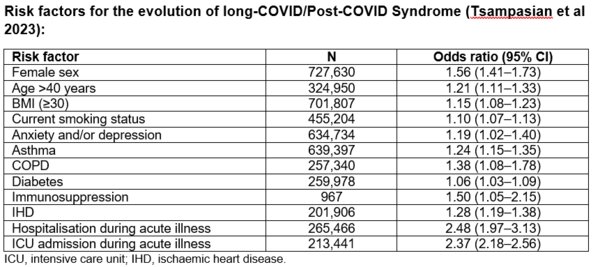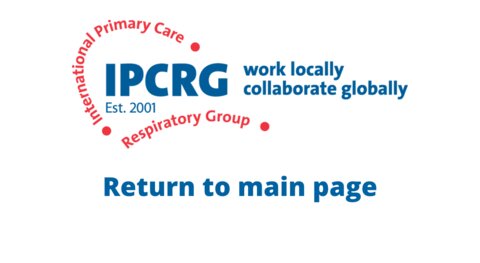What are the risk factors for long-COVID-19 disease/post-COVID syndrome (PCS)?
What the research says:
Female sex, older age and current smoking status are strongly associated with an increased risk of developing post-COVID syndrome (PCS) following an acute SARS-CoV-2 infection (Tsampasian et al 2023). Comorbidities including obesity, anxiety and/or depression, asthma, chronic obstructive pulmonary disease (COPD), diabetes, ischaemic heart disease and immunosuppression are also associated with an increased risk.
Long-COVID/PCS is not limited to patients with severe acute illness and may emerge following even a mild COVID-19 illness. However, hospitalised patients and those requiring ICU admission during hospitalisation are at increased risk for PCS (Tsampasian et al 2023).
What this means for your clinical practice:
- Continue to follow-up with patients once they recover from acute COVID-19 illness of any severity, remain watchful for and treat symptoms persisting beyond 12 weeks from onset of the acute illness
- Remain watchful for PCS among older individuals, females and current smokers as well as those with comorbid conditions including anxiety, depression, asthma, COPD, diabetes, immunosuppression and IHD
For additional guidance on the management of post-COVID symptoms and respiratory-related post-COVID symptoms refer to What medicines are available to treat an acutely unwell person with COVID-19 in the primary care setting to reduce the risk of hospitalisation?
Useful links and supporting references:
Tsampasian V, et al. Risk factors associated with post-COVID19 condition: A systematic review and meta-analysis. JAMA Int Med 2023;e239750. Available at: https://pubmed.ncbi.nlm.nih.gov/36951832/. Accessed May 2023.
Authors:
With grateful thanks to Tiago Maricoto, MD, PhD (Family Doctor, Beira Ria Family Health Unit, Aviero and University of Beira Interior, UBIAir – Clinical & Experimental Lung Centre, UBIMedical; CICS-UBI – Health Sciences Research Centre, Covilhã, Portugal) for and on behalf of the IPCRG practice driven answers review group.
Resource information
- COVID-19
- Long COVID
- Gender
- Risk factor: indoor air pollution
- Risk factor: obesity
- Risk factor: outdoor air pollution
- Risk factor: physical activity
- Risk factor: tobacco - smoking
- Vaccination

